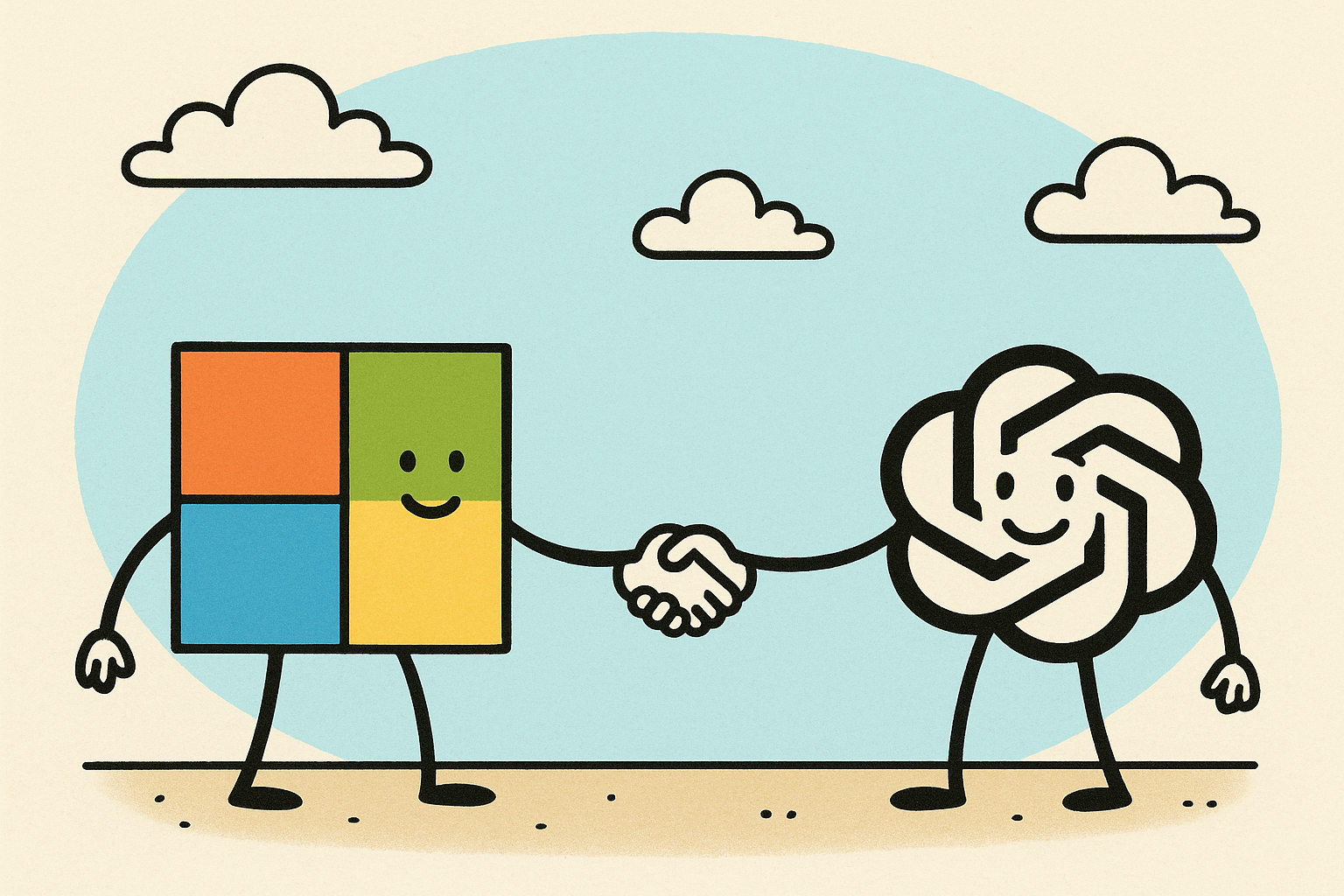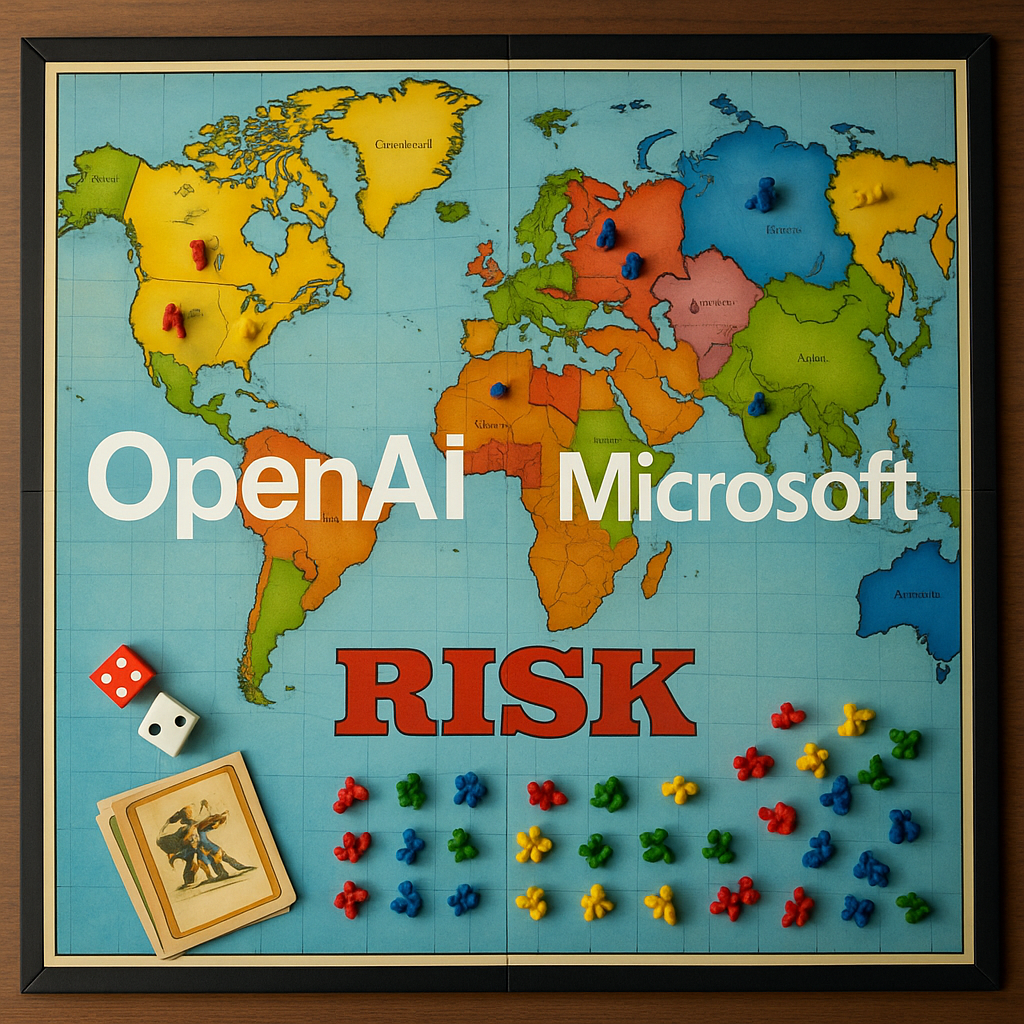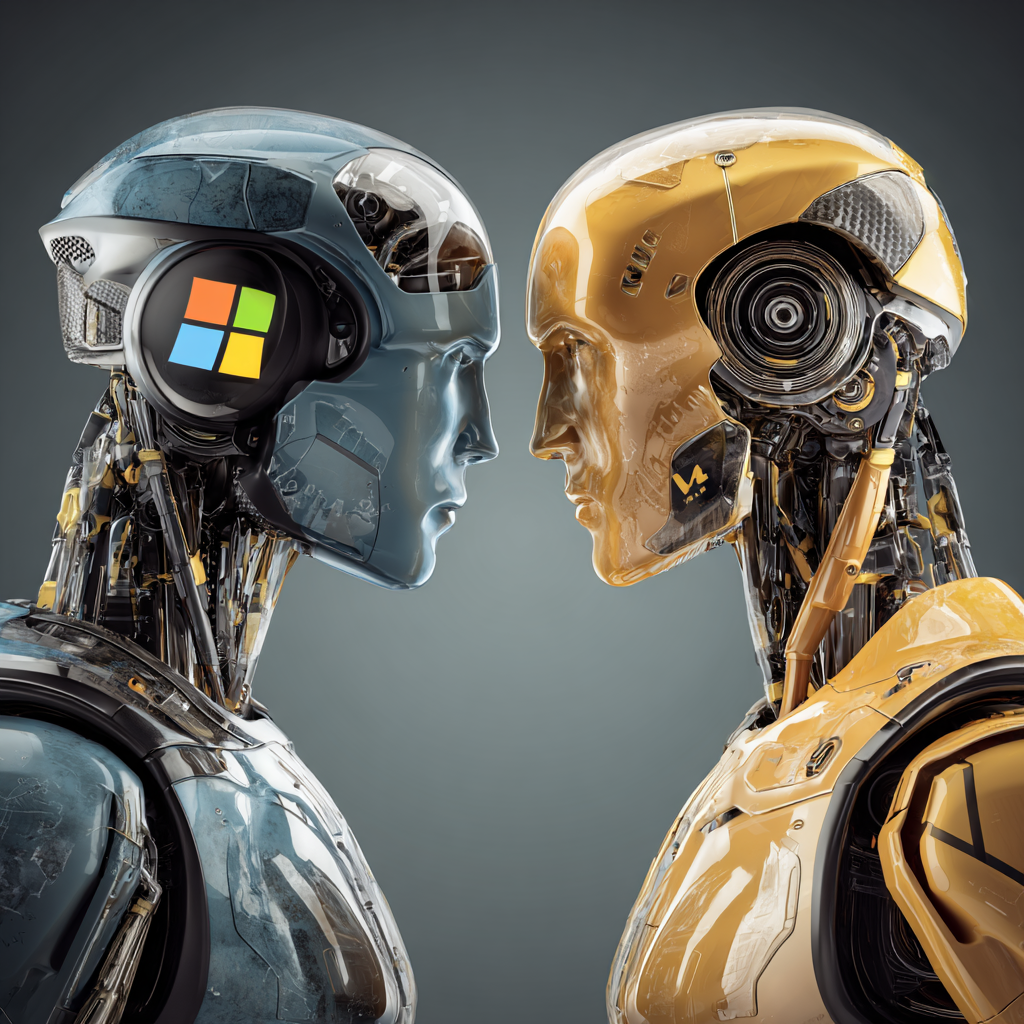OpenAI & Microsoft Agree to Agree, Tentatively

It seems like OpenAI has solved their Microsoft problem. Well, maybe. Tentatively, at least. Pending some pesky details. Details they'd rather not talk about right now, while still letting us all know they're on the same page via a 49-word statement published to both of their corporate blogs at the same time. The statement is so short that the images in each overshadows the text.1 The joint statement, in full:
OpenAI and Microsoft have signed a non-binding memorandum of understanding (MOU) for the next phase of our partnership. We are actively working to finalize contractual terms in a definitive agreement. Together, we remain focused on delivering the best AI tools for everyone, grounded in our shared commitment to safety.
It's settled then. Of course, it's not actually or it would be finalized. But there's clearly some reason they'd like us to know they're working on it!
Experience and common sense suggests that they're trying to get ahead of something. And, in fact, there are a lot of tangential stories floating around out there that could explain the announcement. The biggest one is probably the two key states involved in the matter of OpenAI shifting to a Public Benefit Corporation (PBC), Delaware (where OpenAI is incorporated) and California (where OpenAI resides), are clearly not happy about the recent news around the company being tied to recent tragedies, as ChatGPT, at best, didn't help vulnerable users who seemed to be in bad mental states of mind before taking their own lives and in one case, the lives of others. This narrative has been simmering for some time and now it's boiling over, with the state AGs specifically suggesting the move away from non-profit status may not be the right decision.
This is a big enough problem that there are now whispers of the company debating shifting their domicile elsewhere (which OpenAI has denied). And mixed with their main benefactor Microsoft also apparently blocking the transition – not to mention their original backer and co-founder, Elon Musk, trying to constantly throw wrenches into the process and you have... well, a shitshow.
Alleviating the Microsoft portion of this situation is an important step, but not the only one here. But it should help the company continue to make the case for the PBC transition, which they had hoped would happen this year, but reportedly was pushed into next year because of the impasse with Microsoft. Again, that impasse is now being cleared – well, they're working on it. To me, that suggests OpenAI is very much trying to make this happen this year still.
And yes, contractually they're incentivized to do this because as has been widely reported, OpenAI's new big benefactor, SoftBank, had the right not to fund the remainder of their portion of the $40B fundraise if the company didn't transition by the end of the year. Now there's almost no way SoftBank was going to back out of that agreement regardless – I mean, they're buying up secondary shares right now at $500B, which is significantly higher than the shares they're buying in the primary transaction. They'd be crazy not to take the automatic markup of their money which they can still invest at $300B!
But we're too in the weeds now. The key is that solving this Microsoft situation was perhaps the main element in trying to get a transition done any time soon. And even without the SoftBank deal pressure, the pressure from those states is now far more acute. One imagines that OpenAI wants to get this done quickly before they're sucked into endless political hearings about AI's role in the mental health crisis – which is clearly about to happen.
If that's true, one has to wonder what OpenAI conceded to Microsoft here to get them on board, fast. Again, they're not saying because they're still negotiating, but clearly a big part of it is "The Clause". That is, the stipulation in the original contract that Microsoft would lose access to OpenAI's technology if the company achieved AGI. It's decidedly more complicated than that, including in the who gets to decide what constitutes "AGI" (namely OpenAI's board, which is now a totally different board, composed of people will completely different backgrounds, than the one that was supposed to be determining it), and if Microsoft retained access to "older" AI technology, but the high-level was clearly a problem for Microsoft.
And it keeps coming up because Sam Altman on down has kept hinting that the company may be close to achieving "AGI". It was clearly pissing off Satya Nadella, who made that more or less known, and so talk suddenly shifted to "superintelligence", which is totally different, you see.
At the same time, a lesser known part of "The Clause" apparently also blocked Microsoft itself from going after AGI. This undoubtedly didn't matter to the company at the time of the agreement, but since then – well, things have changed. Including "the blip" – the brief moment in time when Altman was ousted from OpenAI, only to be quickly reinstated with the help of Nadella – which torpedoed the trust between the two sides and led to Microsoft inventing the "hackquisition" process (born out of the way they almost hired all of OpenAI during said blip) to take on Inflection AI talent and bring DeepMind co-founder Mustafa Suleyman on board to lead new AI efforts internal to Microsoft.
Over the past many months, all we've heard is how there was nothing to see to all of this. But of course there was. Including the notion that Microsoft was building their own smaller models because they were deferring to OpenAI for the "frontier" models. Yes, they were doing that because they couldn't build models going after AGI, per "The Clause". But some news this week may be hinting of a big change there – here's Tom Warren reporting for The Verge:
Microsoft AI launched its first in-house models last month, adding to the already complicated relationship with its OpenAI partner. Now, Microsoft AI chief Mustafa Suleyman says the company is making “significant investments” in the compute capacity required to Microsoft’s own future frontier models.
“We should have the capacity to build world class frontier models in house of all sizes, but we should be very pragmatic and use other models where we need to,” said Suleyman during Microsoft’s employee-only town hall on Thursday. “We’re also going to be making significant investments in our own cluster, so today MAI-1-preview was only trained on 15,000 H100s, a tiny cluster in the grand scheme of things.”
Interesting. He continues:
Suleyman hinted that Microsoft has ambitions to train models that are comparable to Meta, Google, and xAI’s efforts on clusters that are “six to ten times larger in size” than what Microsoft used for its MAI-1-preview. “Much more to do, but it’s good to take the first steps,” said Suleyman.
Microsoft CEO Satya Nadella said at the same town hall that he’s “looking forward to us building model capability, so that we can build model-forward products.” Nadella also made it clear that Microsoft will “definitely support multiple models” in its products, and highlighted GitHub Copilot as “the best example” of that strategy.
Yeah, so this news is trickling out of Microsoft's internal meetings. Meanwhile, so is the news that Microsoft may start using Anthropic's models to power Copilot, as Aaron Holmes also scooped this week for The Information. I mean, what?! Microsoft has done a few moves to hedge their bets – including, of course the aforementioned Inflection deal – but this is OpenAI's main competitor replacing them in Microsoft's core AI product. Uhh...
So yeah, what's going on here? Well, in the reporting around the 49-word joint statement, we have this tidbit from Karen Weise and Cade Metz for The New York Times:
As part of their new deal, Microsoft and OpenAI have renegotiated the financial terms of a commercial agreement they signed in 2019. The deal includes how the two companies share technology and how they share revenue from those technologies.
The original agreement also included a clause that rescinded Microsoft’s access to OpenAI’s most powerful technology when the OpenAI board formally decided that the technology had achieved “artificial general intelligence,” or A.G.I., shorthand for a machine that matches the power of the human brain.
This clause remains part of the new agreement but has been modified, according to a person familiar with the agreement who spoke on condition of anonymity because they were not authorized to discuss it.
"The Clause" "remains" but, it's modified. And my guess would be that it's modified such that Microsoft is also now free to pursue AGI and/or superintelligence, and anything else they wish to call it. I'm also guessing they'll also retain some form of access to OpenAI's technologies beyond 2030 – the other aspect of the contract Microsoft had reportedly wanted to change. Again, Microsoft seemingly holds the cards here with the sign-off sword in hand and with all the other issues swirling around OpenAI...
At the same time, another big hold up in any agreement between OpenAI and Microsoft was said to be the future equity stake in the event of a conversion. Because of the non-profit status, Microsoft, alongside all other investors just technically hold rights to future profits at the moment. Those will convert to actual equity with the PBC switch, but it wasn't tenable for Microsoft to hold the same 49% they hold in those profit rights (and it's actually more than that as it starts higher, closer to 75% to start up until a certain amount).
And Microsoft probably doesn't even want such a stake, optically. Regulators might note that say, 49% is a mere percent or two below majority control. The second biggest company in the world suddenly controlling the largest AI company? Yeah, not the best optics there.
My guess has long been that they would net out around a 33% stake in OpenAI. And subsequent reporting seemingly backed this up. There's no word on that stake here yet, but tangential to that, there is word on the stake the non-profit would hold going forward. In fact, it comes in the form of another post on the corporate blog. This one, by Chairman of the Board Bret Taylor, is a whole 324 words. The key words:
As previously announced and as outlined in our non-binding MOU with Microsoft, the OpenAI nonprofit’s ongoing control would now be paired with an equity stake in the PBC. Today, we are sharing that this new equity stake would exceed $100 billion—making it one of the most well-resourced philanthropic organizations in the world. This recapitalization would also enable us to raise the capital required to accomplish our mission—and ensure that as OpenAI’s PBC grows, so will the nonprofit’s resources, allowing us to bring it to historic levels of community impact.
Yes, he puts an actual value – well, a rough value – on the stake. Why? Because it sounds good, of course. Holy shit, $100B? For a non-profit? This has been OpenAI's comms approach to the conversion since they had to move away from a full-on for-profit shift to the PBC move a few months back (amidst a lot of pressure making it clear that wouldn't happen without meaningful protection of the remaining non-profit). Not only will the non-profit remain, and remain in control, it will be the best capitalized non-profit ever, the story goes. And it's probably not wrong! But it's also clearly PR meant to sway those states holding the keys to the conversion kingdom:
This structure reaffirms that our core mission remains ensuring AGI benefits all of humanity. Our PBC charter and governance will establish that safety decisions must always be guided by this mission. We continue to work with the California and Delaware Attorneys General as an important part of strengthening our approach, and we remain committed to learning and acting with urgency to ensure our tools are helpful and safe for everyone, while advancing safety as an industry-wide priority.
And look, a $50M cherry on top too!
As part of this next phase, the OpenAI nonprofit has launched a call for applications for the first wave of a $50 million grant initiative to support nonprofit and community organizations in three areas: AI literacy and public understanding, community innovation, and economic opportunity. This is just the beginning. Our recapitalization would unlock the ability to do much more.
This blog post is also interesting because it reinforces my thought that OpenAI is going to try to execute this transition fast. Like imminently, perhaps. Which again, is why you give the non-statement statement on the Microsoft situation.
Back to the equity piece. Weise and Metz were also able to glean a bit more here:
The nonprofit that now manages OpenAI would become “one of the most well-resourced philanthropic organizations in the world,” Bret Taylor, OpenAI’s board chair, said in a blog post. The nonprofit’s stake will exceed 20 percent of the reorganized company, according to the person familiar with the deal.
A stake that would "exceed 20 percent" is also in line with my guesstimate a year ago that the non-profit would get 25% of the equity. So far, so good. One element that wasn't yet a part of OpenAI's cap table equation back then was SoftBank. And given that they've now shot past the $13B or so that Microsoft has put into OpenAI over the years, clearly their stake is going to be sizable as well upon conversion. One recent report pegs the target at 12%.
So Microsoft at 33%, the non-profit at 25%, and SoftBank at 12% nicely adds up to 70%. But there are many other stakeholders around the table to convert here, most notably Khosla Ventures and the other original investors alongside Microsoft. And then Thrive Capital, who has led a few of the later rounds. And many, many others. And none of that includes equity for Altman, who famously holds none at the moment. That has always been presumed to change with a conversion, but it can't be a massive percentage as we're running out of room, fast.
Oh yes, and what about that co-founder who put up the money to start the whole thing? He remains another big wrinkle here because he's undoubtedly going to argue that his grants to a non-profit should be considered investments for equity if OpenAI is allowed to convert (which he'd still prefer not happen as it makes life easier for his new AI startup competing with OpenAI, xAI). That is a total wildcard here. Imagine if a judge says OpenAI has to give Musk an equity slug...
Regardless, he's seemingly about to get very vocal as OpenAI is clearly accelerating towards the PBC conversion...
Point is, there's a lot going on at the moment and a lot more likely to go on from here. Things which a 49-word statement can't convey. But I can – in 2,500 words.
One more thing: Perhaps a bit less pressing given their current $40B fundraise, but at some point soon-ish, OpenAI does likely need to go public. Because the amount of money they're now projecting to burn is so astronomical, the only way to access it may be through the public markets and tangential instruments (especially given the equity dilution situation mentioned above). And the only path to go public is to move on from their non-profit status...

Update: Sri Muppidi, Aaron Holmes, and Stephanie Palazzolo have a few more details about the potential new agreemenent for The Information, notably that OpenAI may be able to cut the percentage of revenue going to Microsoft in 2030 to perhaps around 8%, down from 20% in the current contract. This is important as it will allow OpenAI to keep a lot more of the revenue it generates, of course.
They also note that" "OpenAI’s nonprofit and Microsoft will each get around one-third of the new company"...










